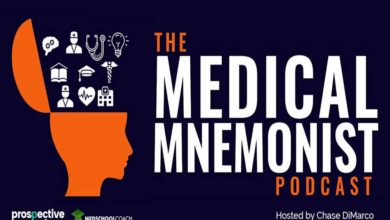Chase DiMarco shares tips for practicing an evidence-based study technique called interleaving, which can be difficult to apply.
- [01:28] Interleaving Topics
- [03:36] Interleaving Materials
- [04:33] Choosing Study Resources
- [06:52] Filtering Question Banks
- [08:19] Stress + Rest = Growth
- [10:57] Recency Bias
- [12:14] Repeating the Same Question Bank
How to Apply the Interleaving Method
Interleaving is tricky to apply because there is no golden rule that is analogous to the 1-1-3-1-1 rule for spaced repetition, for example. Instead, the effectiveness of interleaving depends on various factors such as the topic, the depth at which we studies, and our schedule.
To interleave topics, one method is to ramp up the number of topics and the intensity of study as the week goes forward. For example:
- Monday: Anatomy, 80% intensity
- Tuesday: Pharmacology + Anatomy, 100% intensity
- Wednesday: Biochemistry + Pharmacology + Anatomy, 100% intensity
This method provides several benefits including overcoming the forgetting curve. We tend to forget materials after three days, if we do not review them. This method allows us to review old topics, whilst still learning new ones. In addition, we can prevent burnout. If we study anatomy for the whole week, for example, we will get very tired.
In addition to study topics, we can also choose to interleave study materials. For example, taking the example schedule above, we might listen to an anatomy lecture on Monday, use an anatomy question bank on Tuesday, and then use flashcards on Wednesday. Using various materials for the same topic will help us to remember it better.
Choosing Study Resources
In choosing study resources, Chase reminds us that the evidence for one question bank over another is usually anecdotal — maybe something we read about in a forum. As such, if finances are tight, we should not be afraid to choose a more affordable resource, which is likely just as good. Referencing a forthcoming interview with Dr. Corey Fawcett on the Prospective Doctor podcast, every dollar that we spend on our education can add up to four dollars by the end of repayment. Before purchasing a resource, we should look at our budget and decide if the resource is really worth it.
Study Breaks and Recency Bias
Two more things to keep in mind: 1. remember to schedule breaks and 2. be aware of recency bias. We tend to schedule 7-day weeks without realizing that a good balance of stress and rest is essential to growth. Recency bias refers to the tendency to choose an answer to a question because we covered a topic involving that answer very recently. To combat this, we should apply metacognition and ask ourselves why we choose an answer — because it is correct, or because it is recent?
Sign up for a Free Coaching session with Chase DiMarco, sponsored by Prospective Doctor! You can also join the Med Mnemonist Mastermind FB Group today and learn more about study methods, memory techniques, and MORE! Also, do check out Read This Before Medical School.
